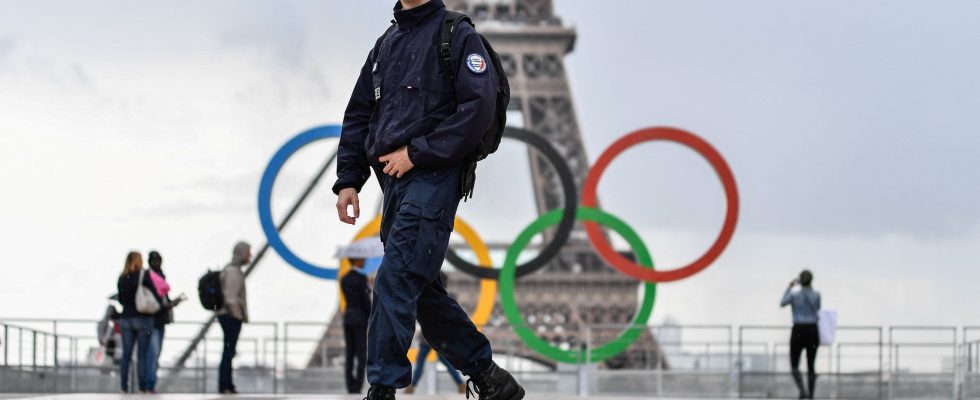After students, the unemployed or retirees, the State is now eyeing… civil servants. The latter are targeted by government incentive campaigns to become security agents for the summer. According to a draft decree consulted this Monday April 15 by AFP, public agents will thus be able to combine their employment with private security activities during the Olympic Games (July 26-August 11) and Paralympic Games (August 28-September 8), to respond to recruitment difficulties in the sector.
“On the occasion of the organization of the 2024 Olympic and Paralympic Games, private security companies are encountering recruitment difficulties,” recalls the government in this text spotted by the specialized media Public actors And AEF Info. “Among the measures likely to be implemented to alleviate these difficulties, the possibility of allowing public officials and state workers to combine their public employment with the lucrative accessory activity of employees of a company has been identified. “private security agents”, it is further clarified. This accumulation of activities, on a voluntary basis, “will imply prior and individual authorization from the public employer” concerned.
The system will only last two months, from July 15 to September 15, and only agents who already hold a professional private security agent card will be eligible. Asked by AFP to know the number of public officials in possession of this sesame, the Ministry of Civil Service did not react this Monday late morning.
An “a priori limited” impact?
On the union side, it is estimated that the decree will have an impact “a priori limited, because this possibility is strictly regulated”. For Stanislas Gaudon, president of the CFE-CGC public services federation, “this decree can be tempting to smooth things out.” But he points out two “pitfalls”: the JOPs take place during the summer vacation period, which can dissuade civil servants from sacrificing them to carry out private security missions. He adds that the draft decree “implies that public officials would still be able to give time and their health” to private activities, while the public service itself is “not great in shape”.
According to the text, which must be formally presented to the unions on April 23 within the framework of the Common Council of the Civil Service (a consultative body), “the exercise of the lucrative accessory activity (of private security agent, Editor’s note) must not undermine the normal functioning, independence or neutrality of the service to which the agent is assigned.
A bonus paid
The Paris Olympic and Paralympic Games are expected to mobilize between 17,000 and 22,000 private security agents, depending on the day. But the sector is already facing significant recruitment shortages: the French Federation of Private Security (FFSP) identifies a permanent need for 20,000 agents to supplement the current workforce of around 180,000.
In order to compensate for this lack, the State has increased its incentive campaigns in recent months in order to supplement its workforce. Special training, shorter (106 hours compared to 175 for a traditional security agent), dedicated to the surveillance of Major Events (SGE) of more than 300 people, has notably been reactivated for students in charge of static missions (palpation, filtering). The Île-de-France region also awards a bonus of 2,000 euros for people following classic agent training, targeting in particular unemployed people, and 800 euros for those who choose “light” training for students. .
Last February, it was even… retirees who were targeted by an information campaign from the National Old Age Insurance Fund (Cnav) and France Travail (formerly Pôle emploi), in order to encourage them to participate in training to join the sector during the Olympics.
The fear of a “windfall effect”
Tony Estanguet, the president of the organizing committee for the Paris Olympics (Cojop), nevertheless wanted to be reassuring at the end of March, assuring the deputies that “97% of needs” in private security were “secure”. The interministerial delegate to the Olympic Games, Michel Cadot, also interviewed at the National Assembly, had affirmed that nearly “18,000 people” had been trained” and that the subject was “to retain them”, that is to say to ensure that they are present in the summer of 2024.
Trade unionist Bernard Thibault, a member of Cojop and former general secretary of the CGT, expressed his doubts to AFP last February about the enthusiasm around the level of hiring in the sector. “Nothing says that they will go to work for the Olympics,” explained the former general secretary of the CGT. The sector feared a “windfall effect” with training promoted by bonuses. “Are we not giving money to people who we know full well will not come at all?” asked Cédric Paulin, secretary general of the Group of Private Security Companies (GES ).
If personnel were missing, it was planned from the start that reinforcements from the army could intervene, as was the case at the London Olympics, in 2012, in particular. Sébastien Lecornu, the Minister of Defense, announced that 18,000 soldiers will be mobilized for the Olympics, including 3,000 aviators responsible for aerial surveillance.
